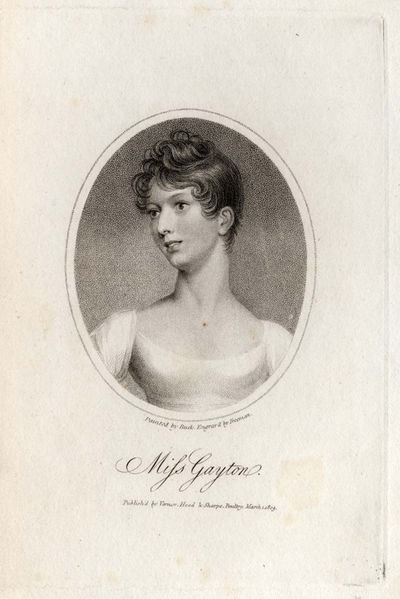Annotation:Miss Gayton's Hornpipe: Difference between revisions
No edit summary |
No edit summary |
||
| Line 16: | Line 16: | ||
''While Gayton bounds before th’ enraptured looks''<br /> | ''While Gayton bounds before th’ enraptured looks''<br /> | ||
''Of hoear marquises and stripling dukes;'' <br /> | ''Of hoear marquises and stripling dukes;'' <br /> | ||
|f_source_for_notated_version=an MS collection by fiddler Lawrence Leadley, 1827–1897 (Helperby, Yorkshire) [Merryweather & Seattle]. | |f_source_for_notated_version=an MS collection by fiddler Lawrence Leadley, 1827–1897 (Helperby, Yorkshire) [Merryweather & Seattle]; William Irwin (1822-1889) music manuscript collection (Lake District, Cumbria) [Offord]. | ||
|f_printed_sources=W. Blackman ('''A Selection of the most favorite Hornpipes for the Violin'''), c. 1810-22; No. 10. William Cahusac ('''The German Flute Preceptor'''), c. 1814; p. 21. Callaghan ('''Hardcore English'''), 2007; p. 21. '''Harding's All Round Collection''', 1905; No. 78, p. 24. Hunter ('''The Fiddle Music of Scotland'''), 1988; No. 330. Kerr ('''Merry Melodies, vol. 1'''), c. 1880; No. 6, p. 26. '''Köhler's Violin Repository, vol. 1''', 1881, p. 56. MacDonald ('''The Skye Collection'''), 1887; p. 172. Merryweather & Seattle ('''The Fiddler of Helperby'''), 1994; No. 34, p. 37 (as “Miss Grayton’s Hornpipe”). Riley ('''Flute Melodies, vol. 2'''), 1817; p. 40. Sweet ('''Fifer's Delight'''), 1964/1981; p. 81. Voigt ('''A Selection of Elegant & Fashionable Country Dances, Reels, Waltzes &c.'''), 1808. | |f_printed_sources=W. Blackman ('''A Selection of the most favorite Hornpipes for the Violin'''), c. 1810-22; No. 10. William Cahusac ('''The German Flute Preceptor'''), c. 1814; p. 21. Callaghan ('''Hardcore English'''), 2007; p. 21. '''Harding's All Round Collection''', 1905; No. 78, p. 24. Hunter ('''The Fiddle Music of Scotland'''), 1988; No. 330. Kerr ('''Merry Melodies, vol. 1'''), c. 1880; No. 6, p. 26. '''Köhler's Violin Repository, vol. 1''', 1881, p. 56. MacDonald ('''The Skye Collection'''), 1887; p. 172. Merryweather & Seattle ('''The Fiddler of Helperby'''), 1994; No. 34, p. 37 (as “Miss Grayton’s Hornpipe”). Offord ('''Bonny Cumberland'''), 2018; p. 52. Riley ('''Flute Melodies, vol. 2'''), 1817; p. 40. Sweet ('''Fifer's Delight'''), 1964/1981; p. 81. Voigt ('''A Selection of Elegant & Fashionable Country Dances, Reels, Waltzes &c.'''), 1808. | ||
|f_recorded_sources=Columbia 33511-F (78 RPM), Margaret McNiff Locke (accord.), Joe Tansey (fid.), E. Colclough (banj.) (1932). | |f_recorded_sources=Columbia 33511-F (78 RPM), Margaret McNiff Locke (accord.), Joe Tansey (fid.), E. Colclough (banj.) (1932). | ||
|f_see_also_listing=Hear Margaret McNiff Locke's 1932 recording on Souncloud.com [https://clyp.it/ovtj1e5g?fbclid=IwAR0yvM7zlVdGgizB2NH8lHOPWplwcFH5N9Ij6WD0riWzbYsq0sBtPqRoz-k] | |f_see_also_listing=Hear Margaret McNiff Locke's 1932 recording on Souncloud.com [https://clyp.it/ovtj1e5g?fbclid=IwAR0yvM7zlVdGgizB2NH8lHOPWplwcFH5N9Ij6WD0riWzbYsq0sBtPqRoz-k] | ||
Revision as of 15:10, 9 December 2022
X:1 T:Miss Gayton's Hornpipe M:C L:1/8 R:Hornpipe B:William Cahusac – The German Flute Preceptor (c. 1814, p. 21) Z:AK/Fiddler’s Companion K:G d>c|B>dg>f g2 d>c|B>dg>f g2 f>e|d>fa>g f>ed>^c|d>fa>g f>ed>c| B>dg>f g2 d>c|B>dg>f g2 g>f|e>fg>e f>ga>f|g2b2g2:| |:g>a|b>ab>g a>fd2|g>fg>e d>BG>B|c>de>c B>cd>B|c2A2A2 g>a| b>ab>g a>fd>f|g>fg>e d>BG>d|e>fg>e f>ga>f|g2b2g2:|]
MISS GAYTON'S HORNPIPE. AKA and see "Dan Cameron's Favorite," "Miss Heaton's Hornpipe]," "Sailor's Hornpipe (3)." AKA – “Miss Gaston's Hornpipe,” “Miss Grayton's Hornpipe.” Scottish, English, Irish; Hornpipe. G Major. Standard tuning (fiddle). AB (Skye): AABB (most versions). As “Miss Gayton’s Hornpipe” it appears in a surprising number of music copybook manuscripts of 19th century English musicians, including George Watson (Swanton Abbott, Norfolk, 1850–80), Miss Best (c. 1850), John Baty (Bethel, Northumberland, 1840–60), William Clarke (Feltwell, Norfolk, 1858), James Haslingden (Midlands?, 1827), Robert Dale Owen (New Lanark, Scotland, 1826), F.W. Davoll (Staffordshire?), the Carlilse manuscript (Carlilse, Cumbria, 1810), John Moore (Tyneside, 1841) and William Tildsley (Swinton, Lancashire, c. 1860) [Callaghan, 2007]. Fiddler William Irwin (Langdale, Cumbria) included it in his 1838 manuscript along with the note: “as played in Carlisle Theatre,” referring to a venue in the Cumbrian town. Shropshire poet and musician John Moore entered the hornpipe into his manuscript collection as "Miss Heaton's Hornpipe."
Francis O’Neill printed the tune under the title “Sailor's Hornpipe (3)” in his Music of Ireland (1903) although he found the tune in R. Cock's & Co.'s Encyclopedia of Melody, One Thousand and Twenty-one Airs Selected from the National Music of All Countries, etc., etc., arranged by William Forde. It is not known how he might have though it had an Irish provenance. It was recorded in 1932 by accordion player Margaret McNiff Locke (along with fiddler Joe Tansey and banjo player E. McColclough), where it sounds much like a barn dance instead of a hornpipe.
Jean Duval is of the opinion that one strain of "Reel de Châteauguay is derived from "Miss Gayton's Hornpipe," and also finds motif's from "Miss Gayton's" form the core of Isidore Soucy's suite "Foins (Les)."

Miss Esther Jane Gayton was a dancer and actress who played a Sylph (fairy) at Drury Lane as early as 1806. Sir Walter Scott mentions her (in the Edinburgh Annual Register, 1810) as performing in 1808 in a revival “of our old favourite, Bluebeard,” in which Miss Gayton appeared in the role previously played by Madame Parisot. In 1809 she married the Reverend William Murray, half-brother of Sir James Pulteney, 7th Baronet or Clermont, Fifeshire, whose title Murray ultimately assumed (Gentleman’s Magazine, May, 1811). She died in 1875.
George Gordon Byron—Lord Byron—mentions Miss Gayton in his lengthy verse called “English Bards and Scotch Reviewers” (1808), in the lines::
While Gayton bounds before th’ enraptured looks
Of hoear marquises and stripling dukes;

